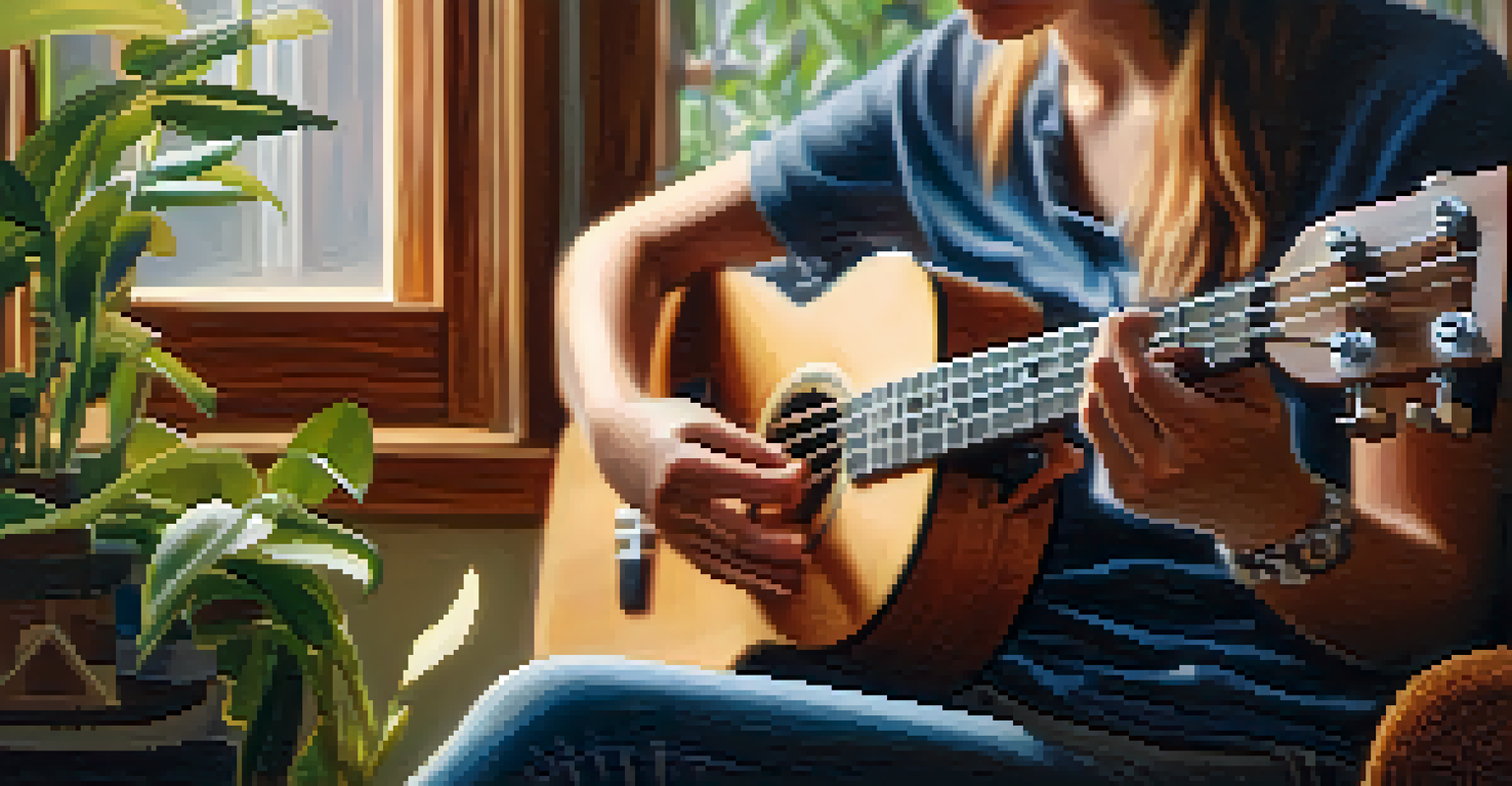Cultural Exchange through Ukulele: Stories from Around the World

The Ukulele: A Brief Introduction and Its Origins
The ukulele is a small, four-stringed instrument that has charmed many hearts worldwide. Its origins trace back to the 19th century in Hawaii, where it was derived from Portuguese instruments like the machete. This little instrument quickly became a symbol of Hawaiian culture, embodying the spirit of joy and community. Today, it has transcended borders, finding its way into diverse music scenes across the globe.
Music can change the world because it can change people.
What makes the ukulele particularly appealing is its accessibility; it's easy to learn, making it an ideal choice for beginners. In just a few strums, one can play beloved tunes, which fosters a sense of accomplishment. This ease of use has helped the ukulele become a bridge connecting different cultures, inviting people from various backgrounds to participate in musical traditions.
As you pick up a ukulele, you're not just playing an instrument; you're joining a worldwide community. From Hawaiian luaus to jam sessions in New York, the ukulele fosters a unique cultural exchange. This simple yet profound instrument serves as a reminder that music can unite us regardless of our differences.
Ukulele in Hawaii: A Cultural Staple
In Hawaii, the ukulele is more than just a musical instrument; it's a vital part of the culture. Traditionally, it accompanies hula dancing, enhancing the storytelling of the dance with its cheerful melodies. Local musicians often share their unique sounds by blending Hawaiian chants and contemporary tunes, creating a rich tapestry of cultural expression.

The stories told through ukulele music often reflect the island's history, myths, and daily life. For instance, songs about the ocean, mountains, and love are deeply rooted in Hawaiian traditions. Musicians use the ukulele to narrate personal stories or legends, making the instrument a powerful tool for preserving culture and heritage.
Ukulele: A Global Musical Bridge
The ukulele transcends cultural barriers, uniting people through its cheerful sound and inviting collaborative musical expression.
Events like the annual Ukulele Festival in Honolulu showcase local talent and invite international musicians, promoting cultural exchange. These gatherings celebrate the ukulele's role in Hawaiian life while encouraging collaboration and friendship between diverse musical influences. It's a beautiful example of how music can create a sense of belonging and community.
The Global Rise of the Ukulele: A Cultural Phenomenon
In recent years, the ukulele has exploded in popularity around the world, attracting people of all ages. Its cheerful sound and playful nature have made it a favorite among musicians and hobbyists alike. From coffee shops in Paris to street performers in Tokyo, the ukulele is creating a global phenomenon that transcends language and cultural barriers.
The beautiful thing about learning is that no one can take it away from you.
Social media platforms like YouTube and TikTok have played a significant role in this surge, with countless tutorials and performances inspiring new players. The ease of access to online resources has allowed anyone, anywhere, to learn and share their love for the ukulele. This has led to a flourishing online community where players exchange tips, tricks, and their own stories, further enriching the cultural tapestry.
As the ukulele continues to spread, it carries with it the stories and traditions of the cultures it touches. Musicians may incorporate elements from their own backgrounds into their playing, leading to unique fusions of style. This blending of musical traditions showcases the ukulele as a true ambassador of cultural exchange.
Stories of Connection: Ukulele and Personal Journeys
Many individuals have found the ukulele to be more than just an instrument; it has become a companion in their personal journeys. For some, it serves as a means of coping with life’s challenges, providing solace during tough times. The act of playing can transform moments of solitude into joyful experiences, reminding players of the beauty in their surroundings.
One touching story involves a young woman who took her ukulele while traveling through Southeast Asia. As she visited various countries, she shared music with locals, learning about their cultures and traditions. Each performance not only enriched her travels but also built lasting friendships, illustrating the unifying power of music.
Cultural Richness in Ukulele Music
Learning the ukulele fosters deeper cultural appreciation by connecting players to the histories and traditions behind the music.
These personal anecdotes reflect a broader theme of connection through the ukulele. Every strum and song creates an opportunity for dialogue and understanding among diverse people. The ukulele becomes a vessel for sharing experiences, fostering empathy, and celebrating the richness of human stories.
Cultural Collaborations: Ukulele Across Borders
The ukulele has also paved the way for cross-cultural collaborations among musicians. Artists from various backgrounds come together to create unique sounds by blending their cultural influences. This not only enriches their music but also promotes understanding and appreciation of each other's traditions.
For example, collaborations between Hawaiian musicians and artists from reggae or folk backgrounds have resulted in innovative styles that merge the best of both worlds. These musical fusions showcase how the ukulele can act as a bridge, connecting different genres and cultural expressions in beautiful harmony.
Such collaborations often lead to the development of new genres, encouraging a spirit of creativity and experimentation. As musicians continue to explore the possibilities of the ukulele, the instrument remains a symbol of unity, demonstrating that music knows no boundaries and can bring people together in a shared celebration.
Learning the Ukulele: A Gateway to Cultural Appreciation
Learning to play the ukulele not only offers a fun musical experience but also serves as a gateway to deeper cultural appreciation. Many players find themselves drawn to the genres and styles associated with the instrument, such as Hawaiian music, folk, and pop. This exploration often leads to a greater understanding of the cultural contexts from which these styles originate.
Instructors often incorporate cultural lessons into their teaching, enriching the learning experience. For instance, a ukulele class might include lessons on Hawaiian history or the significance of certain songs, helping students connect with the music on a personal level. This holistic approach fosters a sense of respect and admiration for the cultures represented in the music.
Future of Ukulele: Embracing Diversity
The ukulele's adaptability and charm promise a vibrant future filled with cross-cultural connections and shared musical experiences.
As learners engage with the ukulele, they become ambassadors of cultural appreciation, sharing what they’ve learned with others. This cycle of sharing not only keeps traditions alive but also cultivates a global community that values and respects diverse cultural heritages. Through the ukulele, players can celebrate and honor the rich narratives that music carries.
The Future of the Ukulele: Embracing Cultural Exchange
As we look ahead, the future of the ukulele seems bright with endless possibilities for cultural exchange. Its adaptability and charm will likely continue to inspire new generations of musicians to pick up the instrument. This ongoing interest will ensure that the ukulele remains a vital part of musical landscapes worldwide.
Emerging technologies and social media will further facilitate connections among ukulele players across the globe. Virtual collaborations and online festivals can bridge gaps between cultures, allowing musicians to share their voices and stories with wider audiences. The ukulele community will likely expand, fostering even more opportunities for cultural dialogue.

Ultimately, the ukulele represents more than just a musical tool; it embodies the spirit of cultural exchange. As players from diverse backgrounds continue to share their stories and experiences, the ukulele will remain a symbol of unity, harmony, and the beautiful connections we create through music.